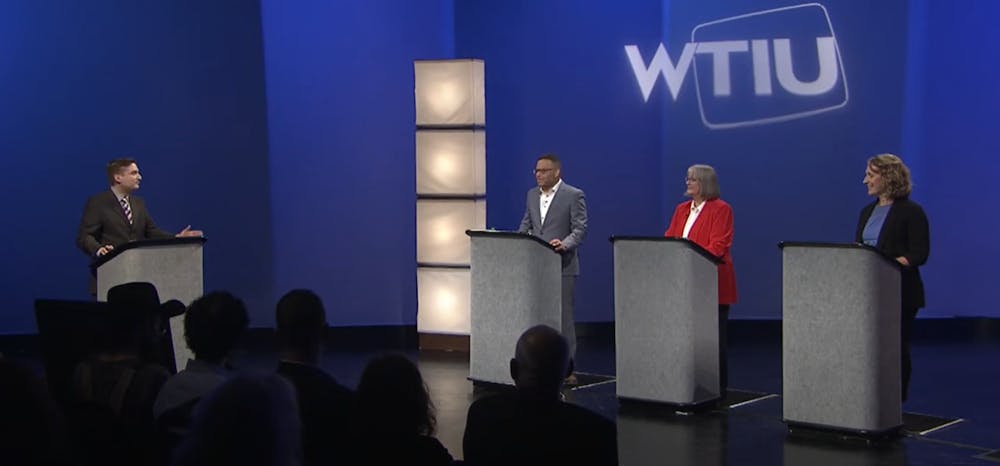The three Democratic candidates vying to be Bloomington’s next mayor — Don Griffin, Kerry Thomson and Susan Sandberg — answered questions about controversial topics in city government at a WFIU/WTIU debate Thursday. With early voting in full swing, voters will have until May 2 to make their choice.
Griffin stands behind current administration’s annexation efforts
During the debate, each candidate stuck to their earlier positions on annexation.
In response to a question about how the city would prevent residents from carrying the tax burden for people who live outside Bloomington but use city services, former deputy mayor Don Griffin said he would proceed with annexation. This would ensure that everyone who uses city services pay their fair share, he said, while also expanding the tax base and giving people living in annexation areas the opportunity to have a voice in city politics.
Kerry Thomson, executive director of the IU Center for Rural Engagement, and city council member Susan Sandberg both said the annexation process was flawed. Sandberg emphasized her “no” vote on annexation when the matter came before the city council. Sandberg also said part of her opposition to annexation was due to the strain she believes it would put on city services like the Bloomington Police Department.
[Related: Primary election voting for mayor, city council begins Tuesday]
Making Bloomington’s criminal justice system equitable
In response to a question about the disproportionate arrests of Black people in Bloomington, Sandberg said reform was necessary, but stressed that she still wanted Bloomington to be known as the worst place to commit a crime. The two, she said, are not mutually exclusive.
She proposed a summit on public safety and equity that would balance reform with ensuring officers can still deal with crime, which she said was “on the rise” in Bloomington.
According to a press release from February, Bloomington’s overall crime decreased by 1% in 2022, but violent crime increased by 5.8%.
Thomson emphasized the need for more people of color serving for the Bloomington Police Department. In addition to representation, Thomson said officers should be engaging with members of the community, saying that proximity to the people they serve is what really moves the needle on equity issues.
Griffin reflected on his personal experience as a Black man, sharing that he has been tailed by the police before, and so have his wife and son. He said the city needs diversity across the board.
“If I’m getting tailed and I was the deputy mayor driving a Mini Cooper, what are other people with plates from outside of town — what’s happening to them?” he said.
Sandberg later agreed with Thomson on the necessity for having more people of color serve with the BPD.
Candidates tackle greenways controversy in lightning round
Tasked with answering two questions in 60 seconds, Thomson affirmed her support for fixing potholes and increasing oversight for the Bicycle and Pedestrian Safety Commission’s traffic calming and greenways program.
A greenway is a low-volume, low-speed road designed to be shared between cars, bicyclists and pedestrians.
The question about greenways refers to Councilmember Dave Rollo’s motion to restore city council oversight for the greenways program following a controversial traffic calming program through Hawthorne and Weatherstone Streets in the Elm Heights neighborhood. The motion was never voted on and Rollo has not brought it up again, although he previously expressed intention to pursue the motion further.
Griffin said it was important to listen to the community but emphasized the need to listen to traffic experts and engineers.
Sandberg said she would want to restore council oversight, saying that the boards and commissions were only resident advisory boards that were not elected or beholden to constituents.
Thomson said that she advocated for a stop sign near her house that some deemed unnecessary, saying she had called 911 for injured cyclists and pedestrians at the intersection twice in one year. She said she hasn’t seen an incident like that since the stop sign was installed.
Last summer, former city clerk Regina Moore read aloud a comment from Thomson at a Traffic Commission meeting concerning the installation of a stop sign at Maxwell and Sheridan in the Elm Heights Neighborhood. The comment stated Thomson had witnessed crashes at the intersection.
[Related: Democratic mayoral candidates split on annexation, city services at candidate forum]
How you can vote
To vote for mayor, in addition to a few city council races and city clerk, registered Bloomington voters can go to Election Operations at 302 S. Walnut St. during the early voting period, which ends at noon on May 1. Specific dates and times for early voting are available here.
Primary Election Day is May 2 from 6 a.m. to 6 p.m. On this day, residents will have to go to their specific polling site to vote.
The general election is on November 7, but the mayoral race currently has no Republican opposition. Independent candidate Joseph Davis is running for mayor but has not collected enough signatures to appear on the ballot yet. Davis, along with any other potential independent candidates, will have until June 30 to collect enough signatures.




